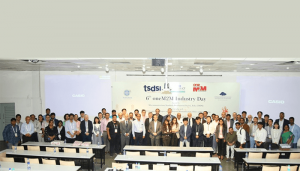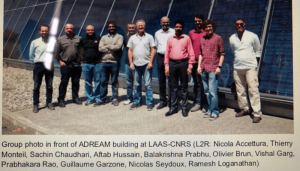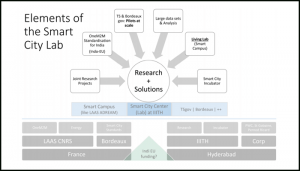With the establishment of the Centre of Excellence on IoT, a Smart City Research Centre and a Living Lab, the International Institute of Information Technology Hyderabad (IIITH) has set the ball rolling for interesting collaborative opportunities in research, education and entrepreneurship in the field of ICT for smart city research.
In July 2020, at the 15th India-European Union Summit that was conducted virtually, an ‘India-EU Strategic Partnership: A Roadmap to 2025’ was presented to outline and guide joint action on various issues of foreign policy and cooperation between the two unions over the next five years. One such issue enumerated was to ‘Continue ICT cooperation under the India-EU Joint Working Group on sustainable digital infrastructure, services, norms and regulatory frameworks, ensuring interoperability of networks, and promoting international standards.’
Centre of Excellence on IoT
Co-operation on ICT-related standardisation began back in 2015 under an EU-funded collaborative project titled ‘India-EU Cooperation on ICT-Related Standardisation, Policy and Legislation’. One of the efforts in this direction saw the setting up of a Centre of Excellence (CoE) on the Internet of Things (IoT) for Smart Cities at IIITH in January 2019. The centre comprises faculty drawn from various research centers such as Building Sciences, Signal Processing and Communications, Center for VLSI and Embedded Systems, Computer Systems Group, and so on, which is essential for interdisciplinary work on IoT for smart cities. As part of the CoE, the joint venture’s primary focus is on the development of knowledge-based initiatives. These include the organization of various activities such as tutorials, hackathons, workshops and conferences on the components of IoT like oneM2M standards for interoperability. “Apart from conducting hackathons, we have now integrated the standards such as OneM2M in our curriculum and they are a part of the IoT courses we offer,” says Dr. Sachin Chaudhari, Assistant Professor at the Signal Processing and Communications Research Center who is the coordinator of the CoE.

Academic and Business Exchange
Another goal of the initiative is to facilitate the exchange of experts between India and the EU. In February 2019, Prof. Vishal Garg who heads the Centre for IT in Building Science (CBS) along with the winning team of the smart city challenge hackathon and a couple of startups from Hyderabad visited Estonia to participate in a leading startup event. Later in July 2019, a five member IIITH delegation comprising of Dr. Chaudhari, Prof. Garg, Prof. Ramesh Loganathan (CIE and Outreach), Dr. Aftab Hussain (Centre for VLSI and Embedded Systems Technologies) and Mr. Prabhakar Rao (CBS) visited France to explore academic collaborative possibilities between French universities, as well as entrepreneurial ventures with startups and the government. They visited the Laboratory for Analysis and Architecture of Systems (LAAS-CNRS), Toulouse, the Toulouse campus of French engineering university INSA and Bordeaux Metropole. It was when they saw the Smart Building implementation in LAAS-CNRS and smart city implementations in Bordeaux Metropole, that there was a consensus among the delegates on doing something similar at IIITH. “We got excited when we saw the smart city deployment. We wanted to convert our IIITH campus into a smart campus or a Living Lab,” says Dr. Chaudhari.

Living Lab
Coincidentally for the IIITH team, under the Smart Cities Mission, the Government of India has been pushing for smart cities in an attempt to drive economic growth and improve the quality of life for citizens through appropriate use of technology. Hence, in collaboration with the Smart City Mission, the Government of Telangana and the Ministry of Electronics and Information Technology (MEITy), IIITH set up a Smart City Research Centre (SCRC) in April 2020. The centre is engaged in research related to IoT verticals such as air quality, building energy, water quality and quantity, street lighting and so on. The aim is to transform IIITH campus into a ‘smart’ one where novel IoT designs and ideas can be experimented with. In order to facilitate startups planning on developing ‘smart city’ products, a Living Lab has been established under the SCRC. This Lab is in partnership with the European Business and Technology Centre (EBTC) and brings the expertise of the Amsterdam Innovation Arena. According to Dr. Chaudhari, “Amsterdam Arena is a ‘smart’ football stadium in the capital of Netherlands. When not used for football matches, the stadium and surrounding area is used for testing smart-city related innovations.” The Living Lab’s aims are three fold – to get the required expertise in IoT for smart-cities related research and deployment, to generate data for the said research and finally to provide a test bed to startups to test out their products. “A dashboard with information on various verticals such as energy, water, weather and so on will be accessible. The first stage of deployment of air pollution nodes has been completed. We now have about a year’s worth of data. Soon, we will extend it to other verticals and engage with startups keen on testing their solutions,” says Dr. Chaudhari.

Exciting Times
As part of the academic collaboration on smart cities, Shubham Mante, a MS student is all set to fly to LAARS-CNRS on a 6-month internship where he will work on the research aspects of OneM2M. With the help of Shubham and another student researcher, Vikrant Dewangan, a Massive Open Online Course (MOOC) on OneM2M has been created. The free online course is typically mandated for all participants of IoT hackathons organised by the institute. Based on this course, a month-long internship program has been planned and is in the works. In addition to this, Dr. Chaudhari says that a hackathon will soon be announced leveraging the air pollution data that has been collected. “Thanks to the CoE, we could also be a part of the Telecommunications Standards Development Society India (TSDSI) and are contributing to the standards body. We are collaborating with various companies now and the engagement with the EU has been very fruitful too. Bordeaux Metropole has evinced interest in implementing their tech at our lab. We will soon be looking at co-hosting MS/PhD students,” says Dr. Chaudhari.


